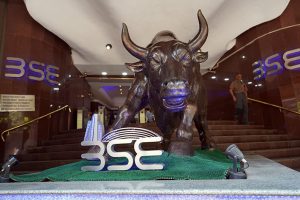Asian shares advanced on Tuesday as investor bets on key US inflation data due out this week fuelled optimism for rate cuts sometime in the near future.
Stocks across the region hovered around 15-month highs and the dollar was firm ahead of Tuesday’s US producer price figures and actual US CPI numbers on Wednesday.
The region’s outliers were China and Hong Kong where stocks slipped, while the yuan weakened, as news of fresh US tariffs and China’s weak credit growth data for April kept sentiment subdued.
Also on AF: US Orders Chinese Crypto Firm to Sell Land Near Missile Base
Tokyo stocks ended higher, though, as buying of export-oriented issues was spurred by the weak yen, but the upside was capped amid caution ahead of that US inflation data release.
The Nikkei share average was up 0.46%, or 176.60 points, to close at 38,356.06, while the broader Topix was ahead 0.25%, or 6.87 points, to 2,730.95.
While heavyweight technology shares like Softbank Group provided some support, the market was also weighed down by rising long-term interest rates in Japan, which increase borrowing costs for companies and weaken the relative attractiveness of equities.
China stocks dropped with US President Joe Biden set to announce new China tariffs as soon as this week targeting strategic sectors, including a major hike in levies on electric vehicles (EVs).
Also denting sentiment was news that new bank lending in China fell more than expected in April from the previous month, while broad credit growth hit a record low, raising the prospect of more action to support the economy.
China’s blue-chip CSI300 index was down 0.21% with, earlier in the session, its financial sector sub-index lower by 0.5%, the consumer staples sector up 0.06%, the real estate index up 0.95% and the healthcare sub-index up 1.26%.
The Shanghai Composite Index dipped 0.07%, or 2.25 points, to 3,145.77, while the Shenzhen Composite Index on China’s second exchange edged up 0.35%, or 6.20 points, to 1,773.00.
But Hong Kong’s Hang Seng index is up 30% from January’s lows and has surged nearly 20% in a month as money has flowed in steadily from mainland buyers.
Investors have welcomed news China will issue one trillion yuan in special bonds as a harbinger of spending, while the weak lending data also shows monetary easing is reaching its limit. Hang Seng volumes last week were the largest in 17 months.
But Chinese H-shares listed in Hong Kong – stocks belonging to companies from the Chinese mainland – fell 0.06% on Tuesday to 6,757.82, while the Hang Seng Index was down 0.22%, or 41.35 points, at 19,073.71.
Alibaba Results Due
Elsewhere across the region, in earlier trade, Singapore, Taipei, Seoul, Mumbai and Bangkok also rose, but Sydney, Wellington and Jakarta slipped.
MSCI’s broadest index of Asia-Pacific shares outside Japan hit its highest since early 2023 in morning trade, before later flattening out.
US, British and European equity futures were broadly steady, with the FTSE and Europe’s STOXX 600 set to open near record levels.
But while Tuesday US producer price figures will be closely watched, the main focus this week is on Wednesday’s US CPI data to see whether some upside surprises in the first quarter were a blip or a worrying trend. Expectations are for core CPI to slow from an annual 3.8% in March to 3.6% for April.
Also on Tuesday, Alibaba is expected to report results and Federal Reserve Chair Jerome Powell is due to speak later in the day.
US Treasuries were steady in Asia trade to leave 10-year yields at 4.49% and two-year yields at 4.86%.
In the currency market, nerves and the inflation expectation survey were enough to keep the dollar from falling. The Dollar/yen measure hit its highest since the start of the month, when traders reckoned Japanese authorities were intervening to buy yen.
The yen traded as soft as 156.4 to the dollar. The euro was steady at $1.0786 and the Australian and New Zealand dollars kept to recent ranges, the Aussie at $0.6606 and kiwi at $0.6015.
Oil and gold were broadly steady with Brent crude futures at $83.40 a barrel and spot gold at $2,339 an ounce.
Key figures
Tokyo – Nikkei 225 > UP 0.46% at 38,356.06 (close)
Hong Kong – Hang Seng Index < DOWN 0.22% at 19,073.71 (close)
Shanghai – Composite < DOWN 0.07% at 3,145.77 (close)
London – FTSE 100 > UP 0.17% at 8,429.57 (0931 BST)
New York – Dow < DOWN 0.21% at 39,431.51 (Monday close)
- Reuters with additional editing by Sean O’Meara
Read more:
China’s ICBC to Sell $4bn of Total-Loss-Absorbing-Capacity Bonds
Double or Quadruple, Biden Tariffs Won’t Really Hurt China
Japan’s SoftBank In Profit Bounceback Despite Vision Fund Hit
Nikkei Dips On Earnings Caution, Hang Seng Gains on Policy Bets























